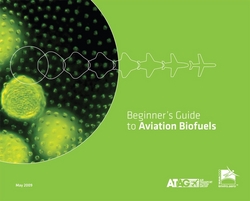Jun 14 2009
Within three to five years, the first drops of sustainable aviation biofuels could be entering the tanks of aircraft, according to the Geneva-based Air Transport Action Group (ATAG). In order to inform industry employees and members of the flying public about this "new age in flight", the group this week launches a new publication, The Beginner's Guide to Aviation Biofuels.

Paul Steele, Executive Director of ATAG, the only global organisation representing all parts of the commercial air transport sector, said, "We are standing at the beginning of a new era in aviation. For the first time we have identified a viable alternative to fossil fuels for commercial aviation. We have seen the age of flying boats, the jet age and the age of democratisation of air travel. In the next few years, we are preparing to enter the 'biofuels age' of flight."
In the last year, the industry has put major focus on the development of sustainable biofuel - a source of energy that could have around an 80 percent reduction in carbon lifecycle emissions compared to current fossil fuel based Jet A-1. There has been a series of successful test flights, with fuels being trialled from such diverse sources as camelina, jatropha and algae by Virgin Atlantic, Air New Zealand, Japan Airlines and Continental Airlines. Further flight tests are being prepared with JetBlue and Interjet in the coming year.
"Those trials were a success from both a safety and a technical viewpoint. We are now expecting at least a small quantity of sustainable biofuels to start being used on commercial flights in the next three to five years." Steele commented.
The Beginner's Guide to Aviation Biofuels has been published to explain some of the benefits for aviation moving to a new, cleaner, source of fuel. "In a poll within the industry, almost half of those surveyed were unsure of the difference between first and second-generation biofuel supplies. Sixty percent don't realise that sustainable aviation biofuels are going to be available in the next few years. This is why an information resource such as The Beginner's Guide to Aviation Biofuels is invaluable."
The Beginner's Guide examines the key safety and technical criteria and the testing process currently underway, while also looking at the challenges that remain if the industry is to maximise the potential of biofuels.
Steele said, "We are now confident that biofuels can be technically used in flight. There remain two major complexities: guaranteeing the biofuel we use is sustainable and doesn't impact on food and water supplies; and ensuring we can get enough to use. The industry has called on governments to support potential biofuel suppliers in developing the necessary feedstock and refining systems until the fledgling sustainable aviation biofuels industry has achieved the necessary critical mass.
"While these are not minor hurdles, they are not insurmountable. After all, the history of aviation is marked by people achieving extraordinary things, despite the conventional wisdom of the time telling them it couldn't be done. We feel the same way about the biofuels age of flight."